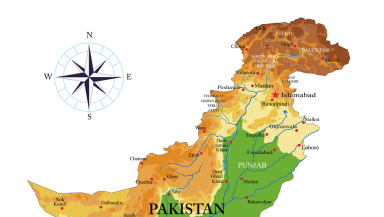
UN human rights experts on Thursday called on Pakistan to make legal changes in light of continued vulnerability of women and girls of minority faiths to forced marriages and religious conversions.
The UN special rapporteurs demanded Pakistan raise the legal age for girls to marry to 18 as a deterrent against exploitation in the 96-percent Muslim country.
"The exposure of young women and girls belonging to religious minority communities to such heinous human rights violations, and the impunity of such crimes, can no longer be tolerated or justified," they said in a statement issued in Geneva.
They expressed concern that forced marriages and religious conversions of girls from minority faiths, including Christianity, were "validated by the courts, often invoking religious law to justify keeping victims with their abductors rather than allowing them to return them to their parents."
"Perpetrators often escape accountability, with police dismissing crimes under the guise of 'love marriages,'" they said.
The experts stressed that child, early and forced marriages could not be justified on religious or cultural grounds. They underscored that, under international law, consent was irrelevant when the victim was a child under the age of 18. At present Sindh is the only province in Pakistan where the legal marriage age for both girls and boys is 18 years, while in Punjab, Khyber Pakhtunkhwa and Balochistan, the minimum for girls is still 16 years.
"A woman's right to choose a spouse and freely enter into marriage is central to her life, dignity and equality as a human being and must be protected and upheld by law," the experts said.
They stressed the need for provisions to invalidate, annul or dissolve marriages contracted under duress, with due consideration for the women and girls concerned, and to ensure access to justice, remedy, protection and adequate assistance for victims.
Notwithstanding the right of children to freedom of thought, conscience and religion in accordance with Article 14 of the Convention on the Rights of the Child, change of religion or belief in all circumstances must be free, without coercion and undue inducements, they said.
"The Pakistani authorities must enact and rigorously enforce laws to ensure that marriages are contracted only with the free and full consent of the intended spouses, and that the minimum age for marriage is raised to 18, including for girls," the experts stated. "Women and girls must be treated without discrimination, including those belonging to the Christian and Hindu communities."
They highlighted cases of forced religious conversions, including that of Mishal Rasheed, who was abducted at gunpoint from her home in Punjab Province while preparing for school in 2022. Mishal was sexually assaulted, forcibly converted to Islam and forced to marry her abductor. They also noted that last month, on March 13, a 13-year-old Christian girl was allegedly abducted, forcibly converted to Islam and married to her kidnapper after her age was recorded as 18 on a marriage certificate.
The UN experts said that Christian and Hindu girls remained particularly vulnerable to forced religious conversion, abduction, trafficking, child, early and forced marriage, domestic servitude and sexual violence.
The group included Special Rapporteur on Freedom of Religion or Belief Nazila Ghanea; Special Rapporteur on Minority Issues Nicolas Levrat; Special Rapporteur on Human Trafficking Siobhan Mullally, and Special Rapporteur on Contemporary Forms of Slavery Tomoya Obokata. The chair of the working group on discrimination against women and girls, Dorothy Estrada Tanck, and members of the working group – Claudia Flores, Ivana Krstic, Haina Lu, and Laura Nyirinkindi – also joined the experts.
The special rapporteurs are part of the Special Procedures of the UN Human Rights Council. Special procedures, the largest body of independent experts in the UN Human Rights system, is the general name of the council's independent fact-finding and monitoring mechanisms that address either specific country situations or thematic issues in all parts of the world.
The UN experts urged Pakistan to bring perpetrators to justice, enforce existing legal protections against child, early and forced marriage, abduction and trafficking of minority girls, and uphold the country's international human rights obligations.
A report published in November 2021 by the All Party Parliamentary Group on Freedom of Religion and Belief claimed that approximately 1,000 girls from other religious groups in Pakistan had been abducted and forcibly converted.
Tehmina Arora, Asia advocacy director for Alliace Defending Freedom International, said a uniform age for marriage across Pakistan coupled with a watchful judiciary will protect the rights and freedoms of young girls across the country, particularly those belonging to the vulnerable Christian community.
"Every year in Pakistan, thousands of minor girls are forcibly converted by and married to their abductors," Arora said. "Nobody should suffer the horrors of abduction, forced marriage and forced conversion."
Pakistan has faced global opprobrium for its shaky commitments to safeguarding religious minorities, and the unwillingness of the Pakistani government to denounce extremism without equivocation. But that has not slowed the momentum of oppression targeting Christians, Hindus, and Ahmadis, who are among the most marginalized and persecuted groups in the country.
Despite attempts to do so, especially in provincial assemblies, liberal Pakistani legislators have been unable to pass legislation against forced conversions and further amending Pakistan's child marriage laws. These two issues have a deep correlation and further complicate attempts to enact any such laws.
Pakistan ranked seventh on Open Doors' 2024 World Watch List of the most difficult places to be a Christian, as it was the previous year.
© 2024 Christian Daily International-Morning Star News













